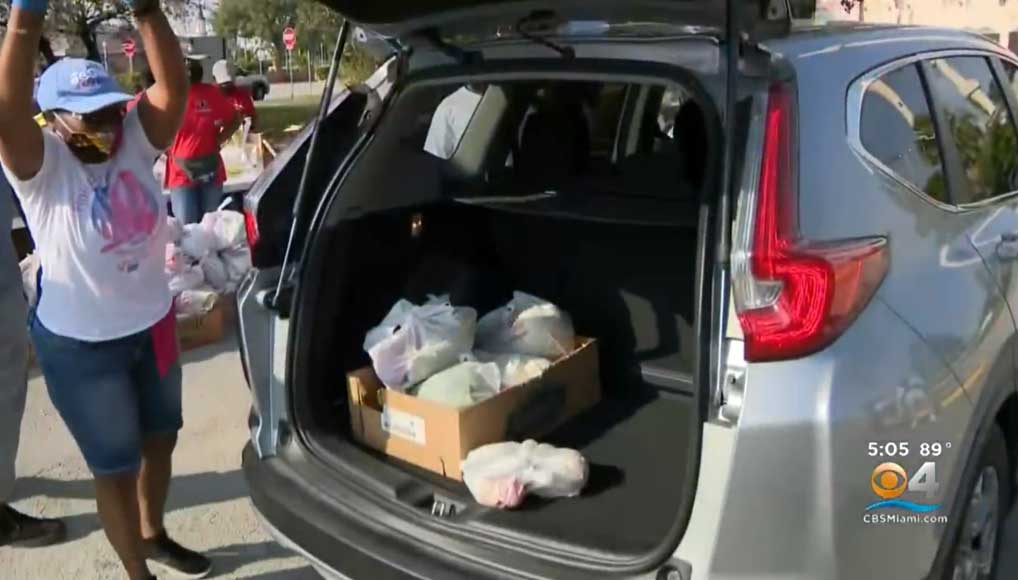Long Lines Of Vehicles Wait Long Hours At Opa-locka Food Distribution Site
MIAMI (CBSMiami) – Hundreds of South Floridians waited hours to participate in a drive-thru food distribution Tuesday morning in Opa-locka.
This was the latest in what has become a daily occurrence to help families struggling during the coronavirus pandemic.
The line outside Sherbondy Park, located in the 380 block of Bahman Avenue, began forming as early as 3:30 a.m. and the food began being distributed at 9 a.m.
Cars with open trunks were being loaded, one by one, with groceries and other necessary household items.
The event took place in orderly fashion and police could be seen to guarantee proper order during the event.
Chopper 4 was over the scene, which showed the long line of vehicles waiting to receive the much-needed food.
“I feel good about this line. We need it,” said Freddie Whitehead, who was picking up food.
“I don’t know what’s inside. All I know is I have needs and I need a lot of things,” said Maria.
Miguel Marquez says it’s a godsend.
“It’s very good help. A lot of people lost their jobs and don’t have income or they lost someone. They are struggling.”
There was enough fruit and vegetables here for 1,500 families.
“Right now there is asparagus, bell peppers, dragon fruit, cucumbers, quite a few items of produce,” said Matthew Pigatt, Mayor of Opa-locka.
It’s a massive effort involving police and volunteers.
“This is a collaboration with the City of Opa-locka and Feeding South Florida and involves quite a few churches and volunteers and help with all this food in Opa-locka.”
“Right now we are dealing with a crisis with the coronavirus. A lot of people are unemployed and they need to get this food and through this line.”
People were told to drive up with their trunks open.
“We are taking all sorts of steps to be efficient and careful. As you can see cars are stretched out for a mile on 27th street and workers and using gloves and masks and sanitary conditions to get through this safely.”
“A lot of people are very grateful for this and I can’t say enough about the volunteers who are giving them help and helping others.”
The mayor is particularly sensitive.
“The city of Opa-locka has 100 confirmed cases of COVID-19 and we’re a small city with just 16,000 people.”
Cindy Vasquez was in this line for three hours and says it was worth the wait.
“I think this was a great thing they were doing for the community and something everyone needs to get through this. We are in a crisis and I like the part everyone is doing.” (1549) “I would like to get through this and never do this again.”
The next food distribution at this location is next Tuesday and every Tuesday. It’s open to anyone in the public.
Based on this demand, it may be a good idea to get here early.
Feeding South Florida is a vital part in the food distribution in South Florida.
CBS4’S Peter D’Oench also went inside the organization’s warehouse in Pembroke Park and spoke with Paco Velez, the President, and C.E.O. Of Feeding South Florida.
He said the last few weeks have been extremely busy.
“Last year in these last 4 weeks we distributed 6 million pounds of food in the four-county area from Palm Beach to the Keys. In the last same 4 weeks this year we distributed 10 1/2 million pounds of food for families really struggling,” he said.
“The crisis that we are facing is much different than a crisis we have ever faced before,” he said.
“Feeding South Florida has helped a lot of people after Hurricanes like Irma and Michael. But in this case, we are limited in the amount of food we can bring in from other parts of the country just because the country has been impacted. We are limited in the number of volunteers we can have in this facility at one time because we are not allowed to congregate.”
He says we are seeing some sobering images with the long lines of people wanting to get food.
“Families are scared,” he said. “Families are desperate because the concern is the unknown. They don’t know when this is all going to end. They don’t know when they are going to get their jobs backs or their incomes. They don’t know when they are going to be able to put food on their table.”
By: Peter D’Oench
Originally published on April 14, 2020 by CBS 4. View original article, here.

